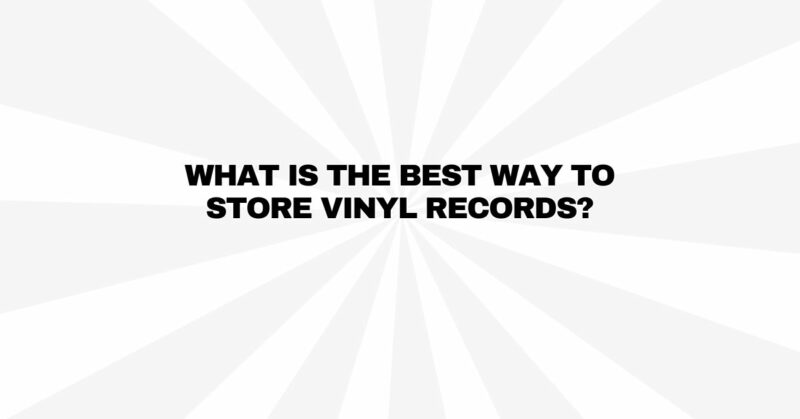Vinyl records, with their analog charm and rich sound quality, have made a remarkable comeback in recent years, attracting collectors and music enthusiasts alike. To ensure your vinyl collection retains its value and plays flawlessly, it’s essential to store your records properly. In this comprehensive guide, we will explore the best practices for storing vinyl records, including the importance of environmental factors, proper shelving, and handling techniques.
Why Proper Storage Matters:
Vinyl records are delicate and sensitive to their environment, which is why correct storage is crucial. Here are some reasons why proper storage matters:
- Preservation of Sound Quality: Vinyl records are susceptible to warping, surface damage, and dust accumulation, all of which can affect sound quality. Proper storage minimizes these risks, ensuring your records sound as good as the day they were pressed.
- Preventing Damage: Records can easily scratch or warp if not stored correctly. Protecting them from physical harm is essential for their longevity.
- Value Preservation: Well-preserved records, especially rare or collectible ones, can retain or increase in value over time. Proper storage is essential for maintaining their condition and value.
- Minimizing Dust and Static: Dust and static electricity can attract to vinyl records, causing pops and crackles during playback. Proper storage can help reduce these issues.
Environmental Factors:
The environment in which you store your vinyl records plays a significant role in their preservation. Here are some key environmental factors to consider:
- Temperature: Vinyl records are best stored at a stable temperature between 60-70°F (15-21°C). Extreme heat or cold can cause warping, while fluctuating temperatures can lead to the expansion and contraction of the vinyl.
- Humidity: Aim for a humidity level of around 40-50%. Excessive humidity can promote mold growth, while low humidity can cause records to become brittle.
- Light: Avoid direct sunlight and fluorescent lighting, which can cause records to fade and covers to deteriorate. UV-filtering window films or shades can help protect your collection.
- Air Quality: Store records in a clean, well-ventilated space to minimize dust and pollutants. Use air purifiers if necessary.
Proper Shelving and Storage:
Choosing the right shelving and storage methods is crucial for maintaining your vinyl collection. Here’s what you should consider:
- Vertical Storage: Store records vertically, like books, to prevent warping. Use sturdy, dedicated record storage shelves or crates that provide proper support.
- Outer Sleeves: Protect record covers by storing them in high-quality outer sleeves. These sleeves shield covers from dust and prevent ring wear.
- Inner Sleeves: Replace original paper inner sleeves with anti-static polyethylene or polypropylene sleeves to prevent scratches and static buildup.
- Use Inserts: To prevent records from leaning or warping, use inserts or dividers between them on the shelf.
- Avoid Overcrowding: Avoid cramming records onto shelves, as this can lead to warping and make them difficult to access. Leave some space for easy retrieval.
- Store Upright: Don’t stack records horizontally for extended periods, as the weight can cause warping over time.
Handling Techniques:
Proper handling is essential to prevent damage to your vinyl records. Here are some handling techniques to follow:
- Wash Hands: Clean hands before handling records to avoid transferring oils, dirt, or sweat onto the vinyl.
- Hold by the Edges: When picking up a record, always hold it by the edges and avoid touching the grooved playing surface.
- Use a Turntable Mat: Place a soft, non-abrasive turntable mat on your platter to protect records from surface scratches while playing.
- Use a Dust Brush: Before playing a record, use an anti-static brush to remove dust and debris from the surface.
- Cueing Arm: Use the cueing arm or lever on your turntable to gently lift and lower the stylus onto the record, minimizing handling.
Cleaning and Maintenance:
Regular maintenance can extend the life of your vinyl records. Here are some cleaning and maintenance tips:
- Record Cleaning Solution: Invest in a record cleaning solution and a brush or microfiber cloth to clean the playing surface.
- Turntable Maintenance: Keep your turntable clean and in good working order. Check the stylus regularly and replace it when necessary.
- Inspect Records: Periodically inspect your records for signs of damage or wear, and address any issues promptly.
- Rotate Records: To prevent warping, periodically rotate the records on your shelf so that they don’t bear the weight of others for too long.
Conclusion:
Properly storing vinyl records is essential to preserving their sound quality, condition, and value. By paying attention to environmental factors, using appropriate shelving and storage methods, following handling techniques, and performing regular cleaning and maintenance, you can ensure that your vinyl collection remains a cherished and well-preserved part of your music journey. With the right care, your records will continue to provide an authentic and immersive listening experience for years to come.


